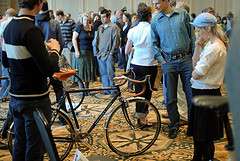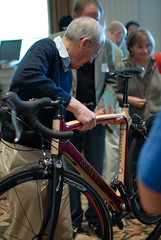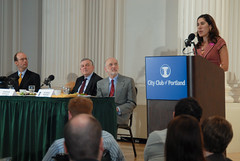There are many signs in Portland that bikes are quickly moving beyond their fringe and “activist” labels of the past (when’s the last time you heard of Critical Mass in this city?). Families pedal our streets in increasing numbers, politicians are eager to embrace bikers and bike-friendly policies, businesses clamor for more bike parking, developers compete to see who can include the best bike amenities in their buildings, and so on.
“For the cost of about one mile of freeway, $50 million, we’ve built a network of 275 miles of bikeways, that’s one heck of a bang-for-your-buck investment.”
— Mia Birk, Alta Planning and Design
But perhaps one of the last bastions of exclusion for bikes is Portland’s old guard. I don’t often report on them, but they’re there. Old-school, socially connected, and civic-minded folks who don’t always see beyond their valet parking and the roads that lead to their hilltop homes.
However, slowly but surely, biking’s new face is presenting itself to them as well, and nowhere has this been more evident as at the City Club of Portland last Friday.
The City Club was founded in 1916 and their laudable mission is to “inform its members and the community in public matters and to arouse in them a realization of the obligations of citizenship”. The club is a regular host to our region’s top visionaries and leaders in the worlds of arts, letters, politics, business and now, bicycles.
Their program on Friday was “It’s All About the Bike”, and once I walked into the grand ballroom at the Governor Hotel (past the well-appointed doormen and sophisticated clientele) I could see what they meant. As City Club members filed in to their lunch tables, they mingled with 18 local bike builders. They stared at the bikes, asked questions, some even got on their hands and knees for a closer look.
The builders ranged from veterans of the craft like Joseph Ahearne, to new builders like Ed Manning of Palmares Cycles (who told me he was a bit “intimidated” by such “top-notch” quality).
The handmade bikes were a fitting first course. After perusing the latest in cyclocross race machines (like the Vanilla Speedvagen), city bikes (Argonaut’s step through was a gem), and even hardwood road racers (Ken Wheeler’s Renovo bikes just get better and better), attendees settled in for a trio of speeches by three bike advocacy superstars.
Bike Gallery owner, past president of the National Bicycle Dealers Association, co-chair of the City of Portland Bicycle Master Plan Update, and Oregon State Parks Commissioner (yes I listed all those to make a point) Jay Graves, started things off with a history of Portland’s bike movement. He said that movement is about to rally around “a plan of action that will radically transform our city.”
Graves appealed to the crowd’s sense of history and duty when he shared that, back in the 1890s — when there were thousands of bicyclists in Portland — most of the city’s roads were dirt and “it was civic and business leaders like all of you that lobbied to get routes paved.”
Mia Birk, the city’s former bike coordinator who founded the firm Alta Planning and Design in her living room and is now working on a memoir about her life in bikes called “Joyride”, took to the mic next. With her trademark energy and optimism, Birk chronicled her work in the 1990s as an evangelist for biking in Portland. Spurred by the passage of our Bicycle Master Plan in 1996 and a trip to Europe that filled her with ideas, she worked neighborhood meetings, hoping to convince Portlanders (one at a time if that’s what it took) that bikes should play a larger role in our city’s future.
Friday, Birk worked to convince City Club members that Portland should do more and invest more in bikes. “For the cost of about one mile of freeway, $50 million,” she said, “We’ve built a network of 275 miles of bikeways, that’s one heck of a bang-for-your-buck investment.” “What if we invested six or seven-percent [of the city’s budget, we currently spend less than one] on bikes? I believe we could reach a 20% mode share.”
“Understand, please, what we’re talking about here today is not the need for a Spandex revolution…the last thing our city needs is more middle aged men wearing tight pants. What we need is a lifestyle revolution.”
— Jonathan Nicholas, The ODS Companies
Taking the torch from Birk was former columnist for The Oregonian and founder of Cycle Oregon Jonathan Nicholas. I’m not sure what it was, (perhaps because he’s freed from The O’s oversight), but Nicholas was more animated and fiery about biking than I’ve ever heard him.
In his moving speech, he told about his inspiration for starting Cycle Oregon and made the case for bicycles as engines that can revitalize both the people and the economy of our city. Now in charge of communications for health and dental care provider The ODS Companies, Nicholas spoke about the current state of the poor health of our citizens and the health care system itself.
“These staggering costs [of health care and sedentary lifestyles] do more than cripple our pocketbooks.” he said, “They stifle business growth and inhibit job creation.” Nicholas called for a revolution:
“Understand, please, what we’re talking about here today is not the need for a Spandex revolution…the last thing our city needs is more middle aged men wearing tight pants. What we need is a lifestyle revolution.”
Nicholas said that the vision laid out by Graves and Birk is a “simply astonishing opportunity” that we would have to be “insane” not to embrace. He then listed “inertia and stupidity, laced with a massive helping of political self-interest,” as the reasons why the vision remains unfulfilled.
Saying that he doesn’t want to settle for “just a trail here, a greenway there,” Nicholas advocated for “the retrofitting of our entire urban environment” through “repurposing” the public right-of-way. For instance, how about taking away an entire lane of traffic on NE Broadway, from 33rd all the way to Portland State and using it for a “a higher, for a healthier, purpose.” (You took the words right out of my mouth Jonathan!)
Nicholas’ speech was inspiring, but for me, his most memorable quip came when the panel was asked to share their favorite local rides. After Mia Birk mentioned Marine Drive, Nicholas chimed in and added,
“Just before you complete the loop, you should pop up under the St. Johns Bridge, and see how everyone involved in the Department of Transportation [ODOT] remodeling that bridge should be utterly ashamed at the woeful job they did.”
Like this candid remark by Nicholas, the speakers balanced their praise of Portland’s accomplishments with a clear sense that there’s work to be done and mistakes to acknowledge (and avoid) as we move forward. Friday’s event was about educating and sharing a vision for bikes with folks who aren’t yet on board. I think it was a raging success on both fronts.
— You can listen to all the speeches via MP3 on the City Club’s website. Also, browse more of my images from the event in the Photo Gallery.












